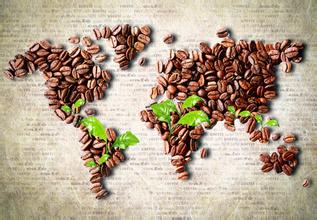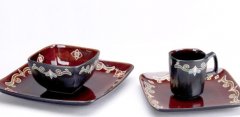Common sense of Coffee Culture Coffee's "History of aggression" to Human beings

Coffee culture
It is said that coffee was first discovered by goats, but the people on earth who like to taste fresh can't stop from now on. Human beings are really curious. Hey! Throughout the history of coffee, it is simply a documentary in which mankind has been conquered by it. Watch the origin and development of coffee with [Ice City Coffee]. As people on earth, we really don't have the strength to fight back!
Origin
Coffee was first discovered in the kaffa region of southern Ethiopia in the 6th century AD.
So far, there is no specific historical data about the origin of coffee, what has been handed down are several different legends, but it is more recognized that Cuddy, the shepherd, discovered the coffee. Legend has it that Kadi, a shepherd in Kafa province in southern Ethiopia, drives his sheep to herd every day. One day he finds that the sheep are suddenly abnormal. Normally docile and obedient, they are suddenly full of energy and alive. Cuddy wondered a little. He found that the sheep had eaten a kind of red fruit, so he picked a few of them and tasted them. He felt much less tired, more energetic, and cheered up.
Cuddy took the unknown fruit to the nearby monastery and gave it to the experienced elders. After tasting it, the elders also felt the obvious refreshing and refreshing effect of the fruit, so he ordered someone to cook soup with the fruit and share it with the monks who chanted in the evening. This unexpectedly solved the problem of monks napping at night, and this magical red fruit began to spread. Because it was first found in the kaffa area, the locals called it kaffa, and later it was called kawha in Arabic and translated as coffee in European English. At first, local people in Ethiopia used to make soup with the fruits of coffee, or mix coffee seeds with animal fat to satisfy their hunger. Ethiopia so far retains not only a large number of wild tree species, but also coffee trees in farmers' courtyards. The most primitive way of making coffee in a long-necked pot is also retained in Egypt.
Introduced into the Arab world
In 525 AD, Ethiopian troops invaded Yemen, and coffee beans were taken to Yemen by soldiers. According to records, coffee trees began to be planted in Yemen in 575 AD. Later, coffee beans were also brought to Egypt by Sudanese black slaves who were shipped to Egypt. After coffee was introduced into the Arab world, it was originally used by Arabs as a herb to treat migraines and promote digestion.
Later, the Arabs invented roasting coffee beans to make a coffee drink, which conquered the Arab taste with its unique aroma and rich flavor, and the Islamic habit of banning alcohol played a role in the spread of coffee at that time. Coffee is called "the drink given by Allah" by Arabs. It is recorded that cafes appeared in Damascus, Mecca and other places in the 15th century. After the Ottoman Turkish Empire conquered the Arab world, it developed coffee into a "national drink" and developed coffee etiquette and mysterious coffee divination. Before the 16th century, coffee was regarded as a very precious drink in the Arab world, and Arabs, especially Yemen, which grew coffee, also monopolized coffee production and strictly prohibited the outflow of coffee seeds and saplings.
Introduced into Europe
The Ottoman Turkish Empire in the 16th century was the center of East-West trade. Coffee, a mysterious drink, naturally attracted the attention of East and West businessmen, who not only formed the habit of drinking coffee themselves, but also wanted to bring this precious drink back to their country. As early as the end of the 16th century, merchants in Venice, Marseilles and London began to secretly bring a small amount of coffee beans home to receive friends with coffee at home.
In 1616, Venice merchants officially imported a bag of coffee beans to Italy for the first time. Europeans covet the seeds and saplings of coffee. In 1615, the Dutch smuggled a coffee sapling out of the port of Mocha, transported to the Netherlands and planted in a greenhouse. Coffee, a "fashionable" and "mysterious" drink from the "Eastern Ottoman Empire", was quickly accepted by Europeans, and a number of cafes came into being. In the coffee shop, people can get together to talk about current affairs, politics and various topics while drinking coffee. In addition, the coffee shop has also become a gathering place for some literati and artists. Coffee has quickly spread in Europe and penetrated into people's lives.
Introduced into North America
The earliest record of coffee in North America was probably in 1668. At the end of the 17th century, tea, cocoa and coffee were spread to North America at the same time, and tea drinking became more popular. After the famous Boston tea pouring event in 1773, coffee naturally replaced tea as the main drink.
Ice City Coffee WeChat account: hrbcoffeeke
Important Notice :
前街咖啡 FrontStreet Coffee has moved to new addredd:
FrontStreet Coffee Address: 315,Donghua East Road,GuangZhou
Tel:020 38364473
- Prev

Coffee utensils Culture in the United States and Italy
The United States is a young and dynamic country, any form of culture in this country, like itself, is unrestrained, unstereotyped and spontaneous, and the coffee culture of the United States is no exception. Americans drink coffee casually, without scruples, without European sentiment, without Arab fastidiousness, and drink freely, comfortably, selfishly and detached. Figure:
- Next

Common sense of Coffee Culture Coffee's "History of aggression" to Human beings II
The widespread spread of coffee in Europe around the world has also brought some problems. A large number of imported coffee beans have caused large foreign exchange losses, coupled with the threat of freedom of speech in cafes to the rule of the authorities. At that time, the rulers of European countries first adopted the way of cutting expenditure, closing cafes and banning people from drinking coffee, but coffee and cafes have become a trend and have been banned repeatedly, so they are opened.
Related
- How did the Salvadoran coffee industry develop in Central America?
- What exactly does the golden cup extraction of coffee mean?
- The Origin of Coffee flower
- [2023 Starbucks World Earth Day] there are more meaningful things besides free Starbucks coffee!
- What kind of coffee is there in Spain? 9 Flavors of Spanish Coffee
- Aromatic African coffee| Kenya's coffee culture and historical production area
- Liberica Coffee Bean knowledge: the characteristics of Liberian Coffee beans of the three original species of Coffee beans
- The origin and formula of Spanish latte introduces the taste characteristics of Bombon coffee in Valencia, Spain.
- How to adjust the solution of over-extracted coffee
- What is the tasting period of coffee beans? What is the period of coffee and beans? How should coffee wake up and raise beans?

